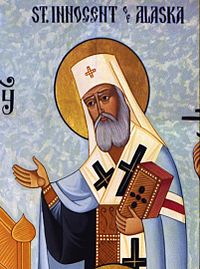This article needs additional citations for verification. (December 2018) |
Innocent of Alaska | |
|---|---|
 | |
| Enlightener of Alaska and Siberia | |
| Born | 6 September [O.S. 26 August] 1797 Anginskoye, Irkutsk Governorate, Russian Empire |
| Died | 12 April [O.S. 31 March] 1879 (aged 81) Moscow, Russian Empire |
| Venerated in | Eastern Orthodox Church[1][2][3] Anglican Communion[4][5][6] |
| Canonized | October 6 [O.S. 23 September] 1977, Moscow by Patriarch Pimen I, Russian Orthodox Church[7] |
| Major shrine | Trinity-St. Sergius Lavra[8][9] |
| Feast | 13 April (as of the 21st century where the Julian calendar is in use) [O.S. 31 March] (repose) 6 October (Glorification) March 30 (Anglican Communion) |
| Attributes | Vested as a bishop, with a moderately long black beard, holding a Gospel Book or scroll |
Innocent of Alaska | |
|---|---|
| Metropolitan and archbishop of Moscow | |
| Church | Russian Orthodox Church |
| See | Moscow |
| Installed | 1867 |
| Term ended | 1879 |
| Predecessor | Philaret Drozdov |
| Successor | Macarius Bulgakov |
Innocent of Alaska (Russian: Иннокентий; August 26, 1797 – 12 April [O.S. March 31] 1879), also known as Innocent Metropolitan of Moscow, was a Russian Orthodox missionary priest, then the first Orthodox bishop and archbishop in the Americas, and finally the Metropolitan of Moscow and Kolomna. Remembered for his missionary work, scholarship, and leadership in Alaska and the Russian Far East during the 19th century, he is known for his abilities as a scholar, linguist, and administrator, as well as his great zeal for his work.
As a missionary priest he took his wife and family with him. In these territories he learned several languages and dialects of the indigenous peoples. He wrote many of the earliest scholarly works about the native peoples of Alaska, including dictionaries and grammars for their languages for which he devised writing systems; also, he wrote religious works in, and translated parts of the Bible into, several of these languages. His books were published beginning in 1840.
- ^ "Святитель Иннокентий, митрополит Московский + Православный Церковный календарь".
- ^ "St. Innocent of Alaska".
- ^ "Иннокентий, митрополит Московский (Вениаминов) / Персоналии / Патриархия.ru". Archived from the original on 2020-06-27. Retrieved 2019-06-06.
- ^ "Innocent of Alaska: Bishop, 1879 | Episcopal Church". Archived from the original on 2019-06-07. Retrieved 2019-06-06.
- ^ "Innocent of Alaska: Bishop, 1879 | Episcopal Church". Archived from the original on 2019-06-07. Retrieved 2019-06-06.
- ^ "Lectionary Calendar".
- ^ "Святитель Иннокентий, митрополит Московский, апостол Сибири и Америки + Православный Церковный календарь".
- ^ "Trinity Lavra of St. Sergius". 25 January 2022.
- ^ "The Holy Trinity-St. Sergius Lavra".